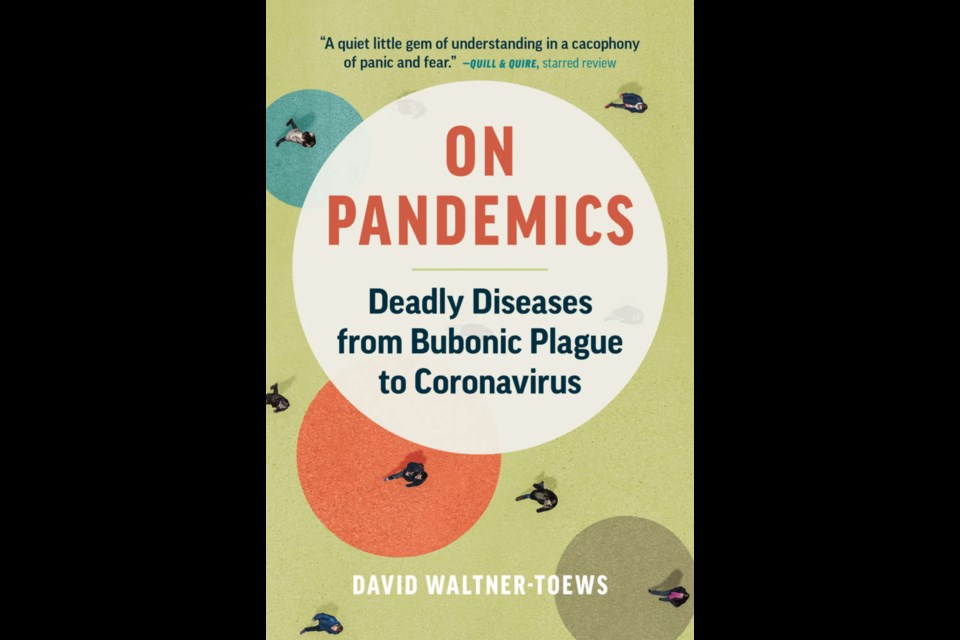Nothing happens in isolation.
That’s what University of Guelph professor and epidemiologist David Waltner-Toews explains in his book On Pandemics: Deadly Diseases from Bubonic Plague to Coronavirus.
Originally published in 2007 as The Chickens Fight Back: Pandemic Panics and Deadly Diseases That Jump from Animals to Humans, the book has been rewritten and reframed under the new title.
“We went from a world in the 1960s with 3 billion people and were up to 8 billion people now. We’re really crowded, we’re all connected,” says Waltner-Toews and when that happens, microbes and viruses are bound to rapidly travel.
While the earlier book focused on the viruses and the transmission from animals to humans, the newer one expands on additional elements that play a major role in the spread of the viruses in a changing, interconnected modern world.
“It’s not just the virus and its not just the animal. It's the relationship between the animals and people and the microbiomes that are shifting around as a result of the kind of the world we live in today,” says Waltner-Toews.
In the book’s introduction, Waltner-Toews compares pandemics to earthquakes and volcanoes in the sense that we know they’re coming but not precisely when, where or how drastic.
Because no single discipline, person or group can be cognizant of everything, he explains, this collaboration of different disciplines is needed to create what he calls a collective peripheral vision.
“We’re used to focusing on one thing. And scientists tend to do that. You find a thing, you study it really hard and you describe it really well,” says Waltner-Toews.
“What we’re not very good at is looking all around and saying how does this relate to everything else around us.”
In the book, Waltner-Toews shares first-hand observations from his international research into zoonotic diseases such as sleeping sickness in Uganda, avian influenza in Southeast Asia and tapeworm infestations in Nepal.
He writes about outbreaks in Canada, including how the restructuring of our urban and rural landscapes expedited the spread of diseases like the West Nile virus and Lyme disease.
Waltner-Toews says it’s important to have platforms where people can share lots of a different kind of information across disciplines to see how different factors fit together such as trying to put together economic and development policies with food security, ecology, climate change,
“These things all interact. People say well it’s not this is, it’s not that. In fact its all of these things together.
He says even if people pull back from international travel, it will not be done in any absolute sense.
“We’re going to be continuing to trade,” says Waltner-Toews and when that happens, it’s not a question of if a virus is going to come, it’s a question of when.
“We’re the ones using the food and other products that are used to justify the destruction of habitats in Africa, Latin America and Asia. If we’re going to keep trading, we have a global responsibility to work with people in other countries to address those ecological issues in their countries.”
With a lot going on in the world politically and economically, Waltner-Toews says once people of different disciplines come together, key places where changes can be made can be identified.
“If you get people together, you can begin to identify where those connections are and what it might mean (for example) how we manage agriculture, how we manage trade, what kind of rules we should be putting in place,” says Waltner-Toews.
With the current worldwide lockdowns and social and economic turmoil caused by COVID-19, Waltner-Toews says we have a chance to organize our economic relationships and the ecological webs that link everything from resource extraction in West Africa and food safety in Europe to reliance on electronic devices everywhere.
“We have an opportunity to reorganize and renew ecological and social relationships that we haven’t had for decades, probably since the 1918 influenza pandemic. It would be a tragedy to let this opportunity slip away,” says Waltner-Toews.
